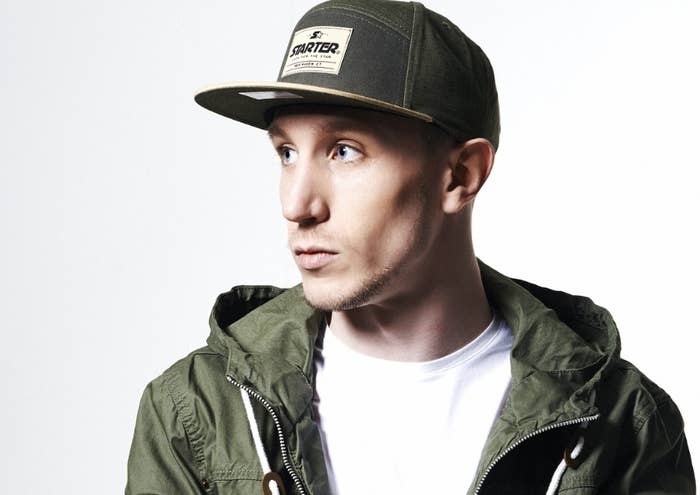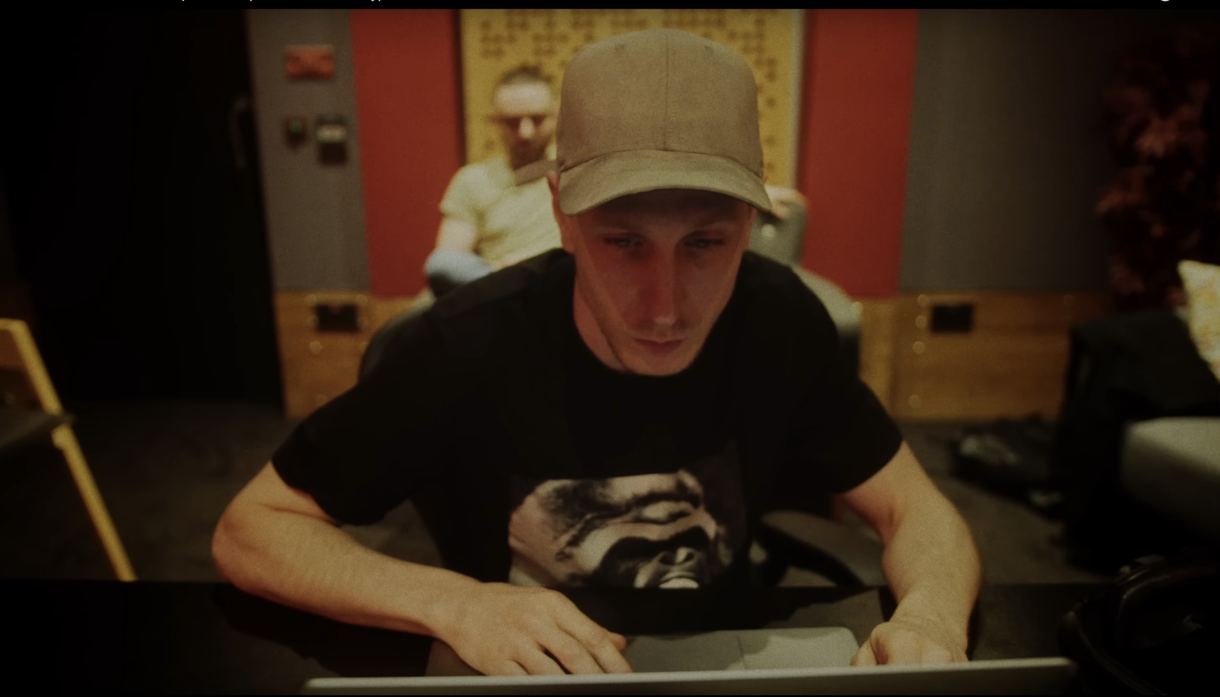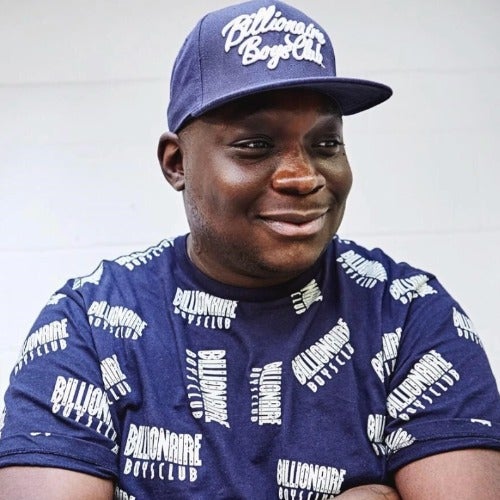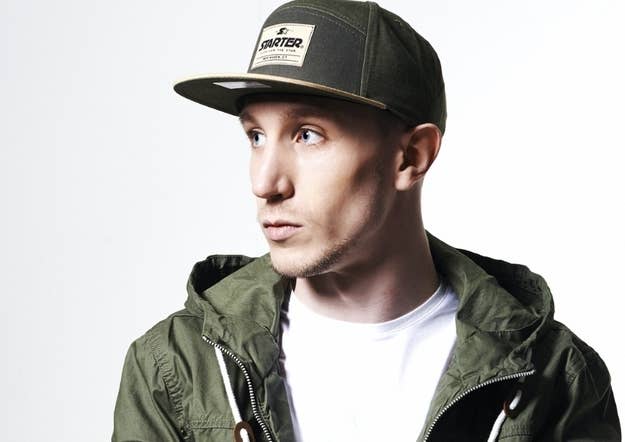
UK rap’s success, especially over the past decade, owes as much to its gifted producers as it does to its blessed rhymesmiths.
In a year in which the world celebrates 50 years of hip-hop—a sound and cultural movement ushered through by DJ Kool Herc, a Jamaican selector and emcee inspired by the soundsystem styles of his native land—as with any successful genre, it’s the collaborative work of artist and producer that has helped rap music become the multi-billion dollar industry that it is today.
From Timbaland, Missy Elliott and Swizz Beatz to Just Blaze, Scott Storch and The Neptunes, many of our lives have been soundtracked by their epic productions, their drum and synth lines lodged into our brains as deep as the iconic bars that lace them. Over in Britain, meanwhile, production stars have also been made out of the likes of Carns Hill, who helped reformulate Chicago drill for the UK masses in the mid-’10s (as did Pop Smoke’s main collaborator, 808 Melo, some years later, by adding grime and trap flavour to the mix) as well as JAE5, whose injection of Afro bounce and swing has given rap a whole new lane to vibe in.
Arguably the most lowkey of them all, though, is Show N Prove—a beatsmith with close to 20 years in the game, who prefers to let his work do the talking for him. “Being behind the scenes, a typical producer, scared of the camera—that’s all a part of it, too,” he tells me. Having met a few times over the years in passing, this conversation about his contributions to the scene was long overdue. “I’ve seen you on your rise and you have seen me on mine,” says the man born Ellis Taylor, “so it’s a pleasure to do this interview.”
Show N Prove, born in Scotland and based in London since 2005, has just finished working on Nines’ fourth studio album, Crop Circle 2, as executive producer. The project landed at No. 2 and is being hailed as one of 2023’s finest releases. But their connection goes back several years: “The first song we did together was ‘Yay’ featuring Tiggs Da Author,” which was released back in 2015 and remains one of his biggest hits to date. “We made it for Nines. We always had him in mind, but I didn’t have any connection to him. So, one day, I just messaged him on Twitter, he replied, and it literally took off from there.”
The multi-platinum producer has also worked with other rap giants, like Potter Payper, Stormzy and J Hus, as well as pop stars such as Lily Allen and Ed Sheeran. His catalogue is extensive. We sat down with Show N Prove to discuss his journey thus far, and how he became one of the most trusted and respected names in UK rap.
“Don’t get me wrong: it’s important to celebrate your goals and successes, but I’m always thinking about the next one and I like to have a lot of things going on at once.”
View this video on YouTube
COMPLEX: We’ve crossed paths many times over the years, but this is the first time that we’re properly sitting down to talk music. From what I know of you, you’re that production genius who prefers to stay lowkey and just do the work. Why don’t you ‘pop out’ like the other super-producers out there?
Show N Prove: Firstly, I just want to say: I appreciate this, JP. You’re a legend, man! I’ve seen you on your rise and you’ve seen me on mine, so it’s a pleasure to do this interview. When it comes to popping out, though, I think it’s just about letting the music speak for me. I mean, I do pop out every now and again, but I’m very much about letting the work speak. And obviously, just being behind the scenes, a typical producer, scared of the camera—that’s all a part of it, too.
You’re from Scotland and you started out working with local hip-hop acts in Edinburgh. Scotland has always had a strong underground rap scene, so that makes a lot of sense. But why hasn’t anyone from there broken through in the wider rap scene as of yet?
That’s a good question, especially seeing, like, in recent years, how Manchester and Birmingham are just as successful as London. But with regards to Scotland, to be honest, I don’t know... I think the accent is a big barrier, but like I said, even with Birmingham, it was once upon a time as well, and then something shifts and something changes and it’s all of a sudden acceptable. Similarly, with Irish drill, that had a moment. There’s not really been a moment, I guess—sad to say—since Shogun’s big freestyle. And even that, as skillful and amazing as it was, some people took it as a bit of a gimmick, a novelty, when it was far from that. Ransom has been doing some really good stuff as well, but I think once we get past the accent thing, it’ll all click into place.
You’re pretty much a Londoner at this point—do you miss home?
I do, man. I miss home. I’ll be in London for a long period of time and then it’ll hit me, like, “I miss my friends, my family—I miss my home!” Then I’ll go home and literally a day later, I’m like: “Get me out of here! Get me back to London.” I love the grind in London, but it’s nice to not be from here and go back home and kind of enjoy that peace. I enjoy it in a different way to when I lived there.
What year did you move to LDN and who was the first known artist you worked with while here?
It was Baby Blue. 2005! Even before I moved to London, I did a song with her and would travel down to work in the studio with her. I went to the video shoot for the song I produced, met so many people that were massive at the time, and it really just clicked in my head that this is where I need to be and what I need to be doing. And then, not too long after that, a guy called Tec—who’s in Show Dem Camp now—I kind of came in under him and worked with a load of up-and-coming artists, as well as closely with Baby Blue, and that was the start of everything.
View this video on YouTube
Which track would you say made people really sit up and pay attention to Show N Prove?
I would probably say [Benny Banks’] “Bada Bing!” in 2012. I mean, at the time, on a different scale and in a very different time in the industry to when the Baby Blue track came out and did a lot for me, I think “Bada Bing!” was what tipped everything over the edge. And even as far as just where music was back then, it kind of changed the landscape a bit. I was doing some work with Dappy at the time and his manager and good friend, a guy called Zee, also managed Benny. I think he still does manage him, actually, or is definitely still close to him. He just plugged me in and where my studio is in North London, he lived literally round the corner, so it was perfect and it just built from there. Then me and Benny kept on working together: I went on tour with him, became his DJ, and really just locked in with him, Zee and the rest of the team... You know what? That whole connection with Zee, it came through Joe Black. I worked with Joe first and then, like typical Joe Black, he plugs you in and puts you in with everyone. So big shouts to Joe—a real legend.
View this video on YouTube
That, he most definitely is. So let’s talk about your inspirations: which producers did you have a close ear on as you were coming into your own as a future beatsmith?
Alchemist—a lot of The Alchemist—DJ Premier, Havoc from Mobb Deep, that whole kinda underground, very East Coast sound. It’s funny, because that’s the sound I started on: very sample-based, very old-school, backpack style, but then I switched it up around the time I made “Bada Bing” and went with that sound. And now, here we are, however many years later, and I’ve gone back to making those old-school-style beats for Nines. It’s come full circle.
How would you describe the Show N Prove sound today?
I try to pride myself on doing a bunch of different sounds. Like, I obviously do the rap stuff, but I also do some rock stuff for people like YUNGBLUD and more R&B for artists like Nippa. I think that, as a producer, it’s good to be able to diversify. Don’t get me wrong: it’s not that I’m NOT a rap producer—that’s my bread and butter—but I’m a producer who can make many different genres. Similar to—and not to blow my own trumpet—Kanye, in the way that he can do anything and does everything, but it’s all rooted in rap.
From working with Baby Blue back in the early 2000s to now going Gold and Platinum with today’s biggest UK rappers, you’ve seen things change closer than most over the years. How has it been to see the scene elevate to where it is right now?
Man, it’s beautiful. Really beautiful. Especially from the Baby Blue days where it was people selling mixtapes on the street and stuff. Even just the way the industry’s changed—obviously, streaming and things like that—but the music, how that evolves and how quickly it evolves now, I love it. I know music moves fast all over the world, but I feel like specifically in this country, there’s a lot of cool, cutting-edge stuff constantly coming up.

You just mentioned streaming; as a producer, majority rap producer, how do you look at streaming and what are your thoughts on this whole AI situation?
I’m just a fan of people getting access to music. My manager and my lawyer might not be happy about that, but to me, as long as music is accessible… In Scotland, we didn’t used to get certain stations that played rap music so for us to now have Spotify, where you can listen to music for cheap or even for free, I think that’s a good thing. With AI, it’s early doors but I’ve done some things. Not faking people’s voices or anything, but I’ve used AI technology within plugins and stuff, so I think, as a producer, it’s good to keep up with what’s going on. But also, it’s about keeping an eye on the moral side of it, too.
So you’re not totally against AI, is what you’re saying?
I embrace it. I think you have to. Same way there’s a new plugin, new keyboard, new sound, new genre that comes out, if there’s a new technology—to me, that’s interesting.
Is there anyone in the UK rap scene that you haven't worked with yet that you’d like to, and who are some of your favourite artists to work with and why?
I was gonna say Headie One, but I’ve actually worked with him, just not in the same room. I think he featured on a song that I produced, but I would love to work with him in the room. Favourite artist to work with? I’d say Nines. We’ve had such a long relationship, and especially over this last album, just really locking in together, it’s more than a typical rap session of sending a beat—we really, really try and build and are really critical of ourselves, which gets the best out of me. Another one, more recently, is Nippa. It’s like the total opposite side of the Nines thing because he’s so new, very young, very hungry and is always learning. So I’d say those two, specifically, because I feel like they bring something different out of me every time.
You’ve been a part of Nines’ musical team for quite some time now. Can you talk us through some of your earlier work with him and how you first connected with him?
The first song we did together was “Yay” featuring Tiggs Da Author, who I’ve worked with for a long time—a long time before “Yay”. We made it for Nines. We always had him in mind, but I didn’t have any connection to him. So, one day, I just messaged him on Twitter, he replied, and it literally took off from there.
“Nines is the Jay-Z of the UK. From the way he approaches his music to the way he conducts his business, it’s just on a different level.”
View this video on YouTube
Wait—so you and Tiggs brought “Yay” to Nines? Interesting stuff. Tell me more [laughs].
[Laughs] Yeah, so we had the chorus and the beat—it changed slightly before it came out—but, yeah, we had the song and sent it to him via DM. Same with Nippa, same with the majority of people I work with—it comes from me messaging them. Credit to Nines for even checking his messages and getting back to me, because that doesn’t always happen. He was like, “Come down to Church Road, meet me and the team,” and the rest is history. We shot a video for it, and it’s one of his biggest performing songs to date—way before the deal or anything like that. Ever since then, I’ve had at least one song on all of his projects since and “Yay” really started that relationship.
Nines knows what works well with his style and flow. So going from producing directly for him to being executive producer of his latest LP, Crop Circle 2, and you pulling in other producers, how did you go about choosing the right people?
Just looking through my phonebook, really. It was all case by case, like: we’re trying to make this song or we have this song that I want someone to work on so we just looked at who would be best suited. And speaking with Nines a lot—a lot of the beats and ideas came from him; it was a real collaborative project—and Karlos as well, who co-EP’d with me. I always say this: Nines is the Jay-Z of the UK. From the way he approaches his music to the way he conducts his business, it’s just on a different level. The Blueprint was also a big inspiration for us when we were creating CC2.
Nines: the Jay-Z of the UK. I can see that. He seems to really respect you, too. I mean, you get shouted out enough on his tracks [laughs].
[Laughs] It’s amazing, man. That’s all I can say. He’s a world-class artist.
View this video on YouTube
Now that you’re at executive producer status, whose project would you like to work on next?
I was actually part of the executive production on Plan B’s last album, Heaven Before All Hell Breaks Loose. I think that was in 2018... Wow! That was a good few years ago, but I was more so part of a team of people and it was a different process to working on Nines’ thing. I feel like the Nines one, I just had more influence and was more attached throughout. I’d like to do something with Larry June, though. Maybe it’s because we’ve done some work recently, but I love his whole vibe and sound and I feel like he’s tapped into what we’re doing over here, so I’d love to do that. Then, over here, maybe someone like Headie One. Potter Payper as well... I’m a massive Potter fan—I’ve known him for years, and we also work super well together, similar to how it is with me and Nines.
You’ve had a lot of success. Even though you’re super lowkey with it, you’ve done a lot of major things. How does it feel to consistently win?
Thank you, man. It feels amazing. But I’m always onto the next one. Even with the Nines thing, even before we finished the album, we were already thinking about the next project and have actually started working on it. Don’t get me wrong: it’s important to celebrate your goals and successes, but I’m always thinking about the next one and I like to have a lot of things going on at once because it keeps me on my toes. Even when I go home from the studio, I’m still messing with things or at least still thinking about it.
Are there any tips that you can give up-and-coming producers who are trying to get their music heard?
I would say just reach out to people. Don’t hold back. Even if people don’t respond, I’m still gonna reach out, and it’s more about showing appreciation from the jump—not like, “Let me try and get something out of this.” So if you really love it and you’re really making stuff for the people you love and listen to, I feel like it’ll find a way. There’s a producer called R14, he’s on Crop Circle 2, and he told me that he was trying to work with Unknown T for forever, making like 100 Unknown T beats—but he couldn’t get through to him. Then he changed his strategy: he did a song with one of his collaborators, K.O, and then he ended up getting Unknown T on it. So that is, like, the perfect example. It’s about working smart and knowing you might not get to Jay-Z but you might get to, I dunno, Meek Mill. And then just having your hustle and carrying yourself right, being polite and stuff—that doesn’t go amiss.






